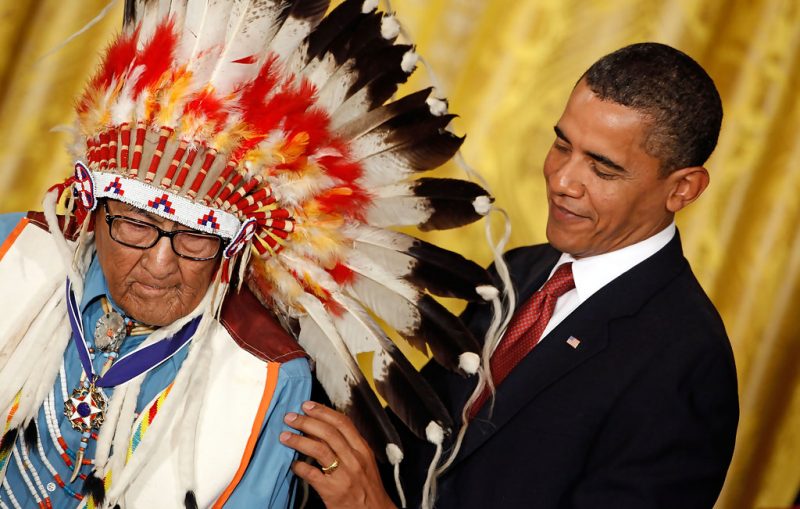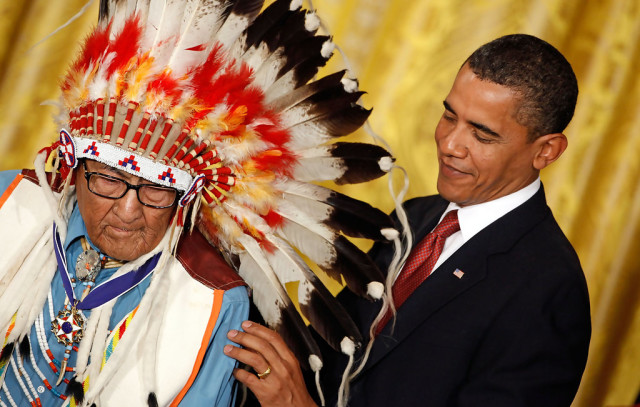
According to the Crow Nation, a man has to do four things in order to become a war chief: (1) touch an enemy without killing them – which is called “counting coup,” (2) take an enemy’s weapon, (3) lead a successful war party and survive it, and (4) steal an enemy’s horse. Joseph Medicine Crow High Bird did all that, but not in the Wild West of America, oh no. It happened in Europe during WWII.
Medicine Crow is a member of the Apsáalooke (Crow) tribe. Born on 27 October 1913 in Montana, he’s still hail and hearty as of February 2016 – meaning he’s 102 years old. A direct descendant of warriors, his paternal grandfather, White Man Runs Him, was a scout for General George Armstrong Custer and actually witnessed the Battle of Little Bighorn first-hand in 1876.
He was named after his maternal grandfather, Chief Medicine Crow, who would teach the younger man his people’s ways. In a time when the state took Amerindian children away from their parents in order to Americanize (and therefore “civilize”) them, Medicine Crow was to have a different fate. His was a traditional Crow upbringing: learning to ride horses bareback, running barefoot through snow, hunting animals on his own, tracking, and fighting. He was also taught the history and traditions of his people.
In 1928, the tribal elders sent their 15-year-old protégé to Bacone College in Muskogee, Oklahoma: a Baptist, English-speaking school. They wanted him to be educated on their terms, not that of his later teachers.
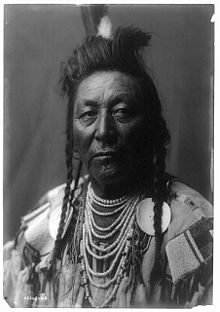
Medicine Crow acquired his bachelor’s degree in 1938 from Linfield College in McMinnville, Oregon making him the first in the Crow nation to receive higher education. He then went on to the University of Southern California where he got a master’s degree in anthropology in 1939.
This also made him the first in the Crow tribe to receive a master’s degree. His thesis, The Effects of European Culture Contact upon the Economic, Social, and Religious Life of the Crow Indians, remains an important document about the Crow nation – especially since it has undergone massive changes since the thesis was submitted. Few now speak the Crow language, which is why UNESCO deemed it endangered in 2012.
Medicine Crow was working on his doctorate degree (again in anthropology) when America entered the war in 1941. On 15 November 1942, the 103rd Infantry Division was created and Medicine Crow became part of it. After almost two years of rigorous training, the division was sent to Europe on 11 September 1944, landing at Marseilles on October 20, as part of Operation Dragoon, the Allied invasion of Southern France.
Before he left, Medicine Crow was given some ochre and an eagle feather painted yellow. Mixing the ochre with water, he’d paint red stripes on his arms then cover it with his uniform to give him strength in combat. The feather would be put on his head beneath his helmet for protection.
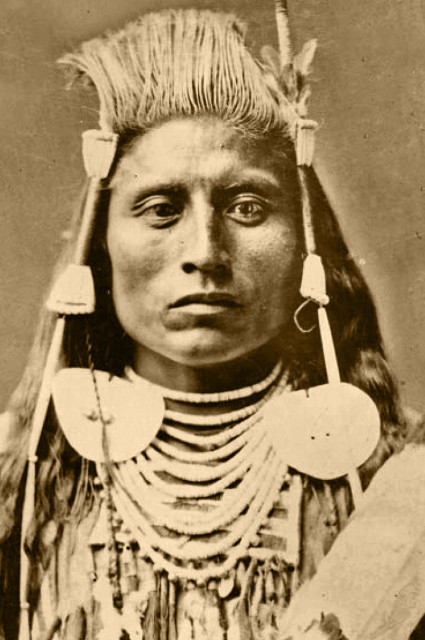
He needed it, because his division plowed through France on November 9 and attacked enemy positions to the west of Saint Dié on November 16. By December 4, they had taken the town of Selestat, a mere 11 miles from the German border. Then they attacked the Siegfried Line (Germany’s border defenses) on December 15, but were repulsed, in heavy fighting.
On 15 March 1945, Medicine Crow was ordered to lead a seven-man squad (each with explosives) to blast German positions along the Siegfried Line. They succeeded in blowing up an enemy post, and since he was the leader, Medicine Crow was the first to break through the line and bring the war into German territory. The Siegfried Line had been breached, at last.
The 103rd attacked the town of Münsingen on April 24 and were met by fierce German resistance. So Medicine Crow was ordered to flank the Germans who were on a wide street. He ran down an alleyway and straight into an enemy soldier who was probably trying to do the same thing to the Americans.
Helmet bashed against helmet. As Medicine Crow fell back, he swung his rifle and knocked the other man’s weapon out of his hands. The German lunged, knocking them both to the ground where they tussled, but Medicine Crow grabbed his gun from his hip and aimed.
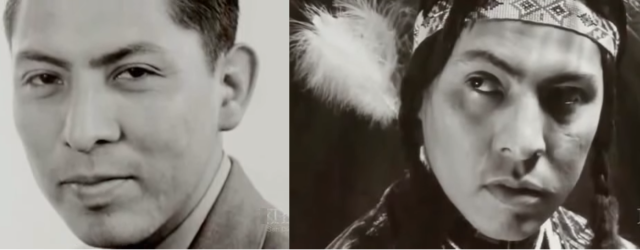
Then his old fighting days came back to him. He didn’t want to shoot a German with a gun. Medicine Crow wanted to rip the man apart with his bare hands. He reached up, grabbed his enemy’s throat, and began pummeling the man with his other fist.
“Mama! Mamaa!” the German shrieked weakly in tears, realizing he was about to die.
Medicine Crow’s rage melted… he let the man go. Shortly after, the Germans surrendered. They didn’t have enough ammo left and had lost the will to go on fighting. They, too, were tired of the war.
The next day, the 103rd made their way to the Danube, hoping to cross over near Ulm. Medicine Crow went ahead to scout the land when he saw some men on horseback. Looking through his binoculars, he realized they were Germans so he followed them to a stone farmhouse, where about 50 fine horses were grazing.
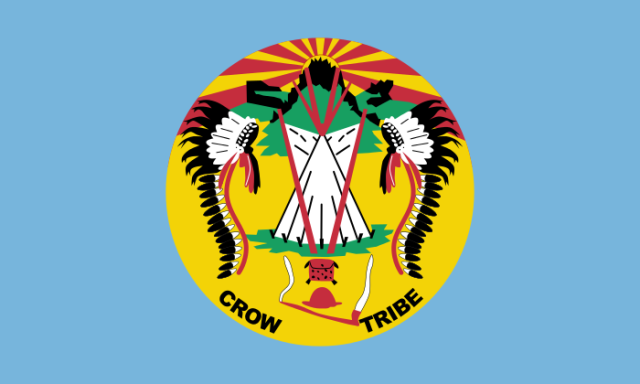
His captain ordered the farmhouse surrounded so they could attack at dawn. Just before dawn, however, Medicine Crow asked if he could have five minutes. The Germans had put the horses in a corral before going to sleep, and Medicine Crow didn’t want them hurt during the attack.
Sneaking his way to the enclosure, he saw some guards sleeping in a nearby shed. Approaching one of the horses, he managed to calm it, then took a rope and made a bridle out of it. Opening the gate, he mounted the horse and rode off. It worked. The other horses followed, then scattered. Heart soaring, he began singing a song of gratitude. The Germans started firing, but the Americans began their bombardment.
When Medicine Crow returned home, the elders asked him what he did during the war. When he told them, they said that he had fulfilled the four conditions needed to become a war chief. Given the fact that the Crow no longer raided or fought the American government he’d probably be the last.
On 25 June 2008, he received the Bronze Star and the Légion d’honneur, and on 12 August 2009, President Barack Obama awarded him, almost certainly the last Crow War Chief, the Presidential Medal of Freedom.
He died on Sunday, April 3rd 2016, age 102.
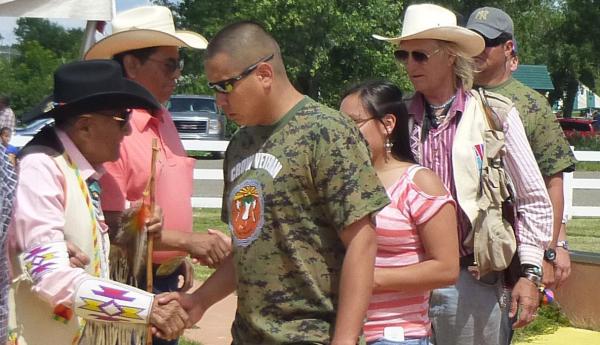
- US President Barack Obama presenting Dr. Medicine Crow with the Presidential Medal of Freedom in Washington, DC in 2009
- Alaxchíia Ahú (Plenty Coups)
- Chief Medicine Crow, Joe’s maternal grandfather and teacher
- Medicine Crow in in the 1930s
- Flag of the Crow Nation
- Dr. Medicine Crow (left) celebrating his 100th birthday in 2013
